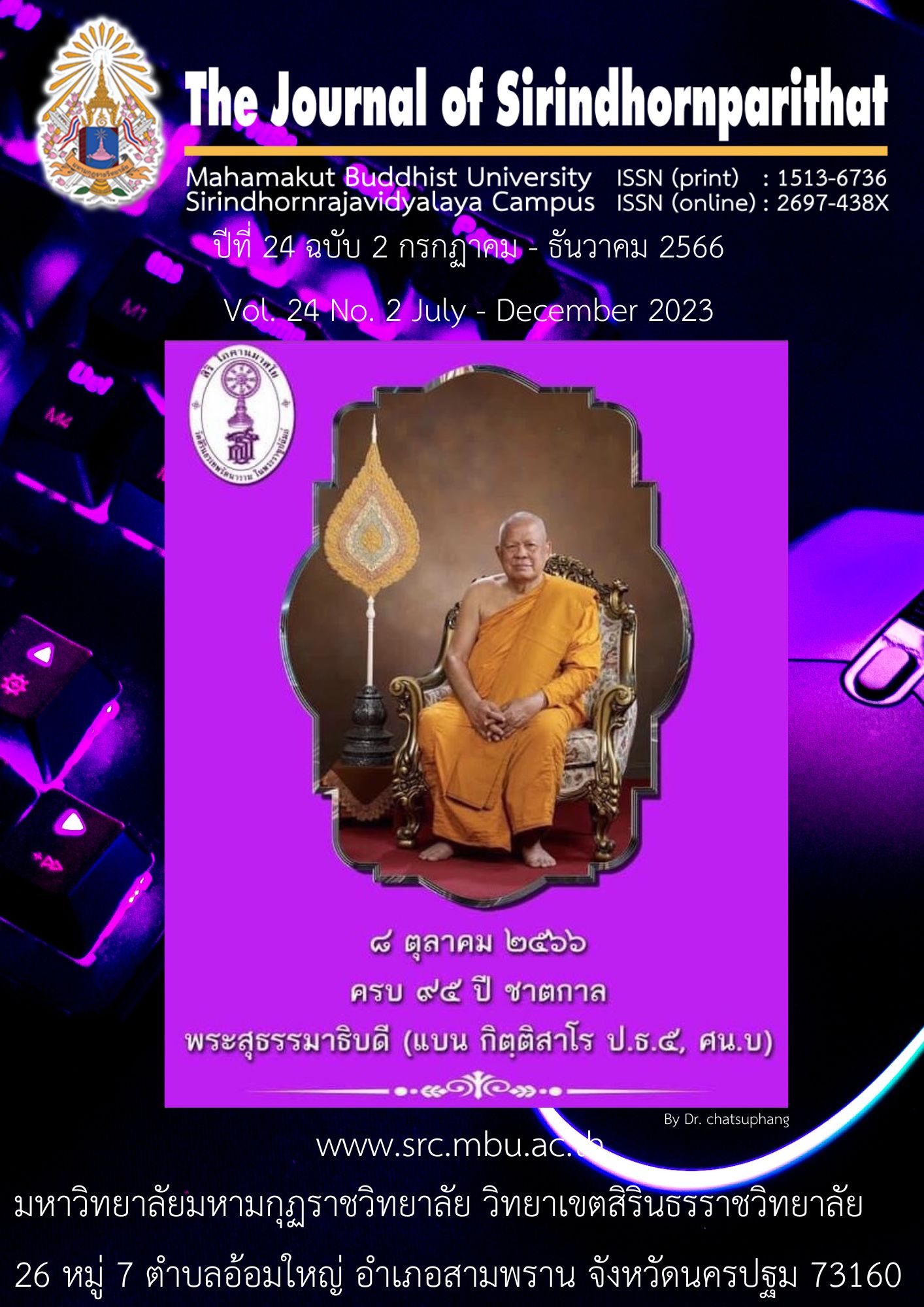The Relationship Between Operation of Professional Ethics of Administrators and School Happy Workplace Under Ratchaburi Educational Service Office Area 1
Keywords:
school administrator ethics, School to be Happy workplaceAbstract
The purposes of this research were to study 1) The application to be use school administrator ethics 2) schools to be happy workplace 3) The relationship between the application to be use school administrator ethics and the happy workplace of schools. The samples were 122 administrators by purposive sample and 244 teachers by simple random sampling. The research instrument was a 5-level estimation scale type questionnaire with confidence value of 0.87 The statistics used for analysis were frequencies percentage, mean, standard deviation and simple correlation.
The research findings were as follows:
- The application to be use school administrator ethics were overall at a highest level. The classification were finding that: All aspects were at the highest level. Sort the mean from highest to lowest that: professional ethics, ethics for service recipient, self ethics, ethics for co-professional, ethics for society respectively.
- The schools to be happy workplace were overall at a high level. The classification were finding that: It was at the highest level in 3 sides and sort the mean from highest to lowest were happy soul, happy brain, happy relax. It was at the high level in 5 sides and sort the mean from highest to lowest were Happy society, Happy heart, Happy body, Happy money and Happy family respectively.
- The application to be use school administrator ethics and schools to be happy workplace were significant positive correlation at the .01 level
References
กระทรวงสาธารณสุข กรมสุขภาพจิต. (2552). ความสุขและสุขภาพจิตในบริบทของสังคมไทยกรกฎาคม – ตุลาคม 2552. กรุงเทพมหานคร: สมาคมจิตแพทย์แห่งประเทศไทย.
กระทรวงศึกษาธิการ. (2545). พระราชบัญญัติการศึกษาแห่งชาติ พุทธศักราช 2545. กรุงเทพมหานคร: ผู้แต่ง.
นภัส จิตตธีรภาพ. (2554). ความสุขในการทำงาน และความผูกพันต่อองค์การของพนักงาน กรณีศึกษา โรงงานอุตสาหกรรมผลิตอาหารแห่งหนึ่ง. วิทยานิพนธ์ศิลปศาสตรมหาบัณฑิต สาขาวิชาจิตวิทยาอุตสาหกรรมและองค์การ มหาวิทยาลัยธรรมศาสตร์.
พินิจนารถ ลำดวน. (2552). ความสัมพันธ์ระหว่างการปฏิบัติตนตามจรรณยาบรรณวิชาชีพของผู้บริหารสถานศึกษาตามการรับรู้ของครู สังกัดสำนักงานเขตพื้นที่การศึกษาพระนครศรีอยุธยา เขต 1. วิทยานิพนธ์ ครุศาสตร์มหาบัณฑิต มหาวิทยาลัยราชภัฎพระนครศรีอยุธยา.
รุ่งนภา ชุณหวรชัย. (2556). แนวทางในการพัฒนาสู่องค์กรแห่งความสุข “คึกฤทธิ์ อาร์คิเทค”. ปริญญาบริหารธุรกิจมหาบัณฑิต สาขาวิชาบริหารธุรกิจ มหาวิทยาลัยขอนแก่น.
วัชราภรณ์ เพิ่งจิตต์. (2543). ความสัมพันธ์ระหว่างค่านิยมทางวัตถุกับความพึงพอใจในชีวิต: การศึกษาเปรียบเทียบระหว่างผู้ปฏิบัติศาสนกิจตามแนวสันติอโศกผู้เป็นสมาชิกสโมสรโรตารีและพนักงานทั่วไปในองค์กรขนาดใหญ่ในเขตกรุงเทพมหานคร. วิทยานิพนธ์ ศิลปศาสตรมหาบัณฑิต สาขาวิชาจิตวิทยาสังคม บัณฑิตวิทยาลัย จุฬาลงกรณ์หาวิทยาลัย.
ศศิธร เหล่าเท้ง และ วิโรจน์ เจษฎาลักษณ์. (2557). อิทธิพลของกิจกรรมสร้างสุขในองค์กร ตามแนวทางความสุข 8 ประการ ที่มีต่อความสุขในการทำงานประสิทธิภาพการทำงานและความตั้งใจในการลาออกของพนักงานบริษัทเอกชน. Viridian E – Journal. 7(2): 988-1006.
ศิวดา กล่อมสุข. (2556). ความสัมพันธ์ระหว่างพฤติกรรมผู้นำแบบสนับสนุนกับความผูกพันต่อองค์กรของพนักงาน บริษัท อุตสาหกรรมการบิน จำกัด. สาขาวิชาบริหารธุรกิจมหาบัณฑิตมหาวิทยาลัยเทคโนโลยีราชมงคลธัญบุรี.
สุวิมล บุญลี และสุวิมล โพธิ์กลิ่น. (2557). การปฏิบัติตนตามจรรณยาบรรณวิชาชีพของผู้บริหารสถานศึกษา สังกัดสำนักงานเขตพื้นที่การศึกษาประถมศึกษาอุบราชธานี เขต 1. บัณฑิตวิทยาลัยพิชญทรรศน์ 9.
สำนักงานกองทุนสนับสนุนการสร้างเสริมสุขภาพ. (2554). Happy คนที่ทำงานมีความสุข ที่ทำงานน่าอยู่ชุมชนสมานฉันท์. กรุงเทพมหานคร.
สำนักเลขาธิการคุรุสภา. (2552). รายงานการประชุมสัมมนาผู้แทนผู้ประกอบวิชาชีพทางการศึกษาส่วนภูมิภาค. กรุงเทพมหานคร : โรงพิมพ์คุรุสภาลาดพร้าว.
Blake, R., & Mouton, J. (1964). The Managerial Grid: The Key to Leadership Excellence. Houston TX: Gulf Publishing Company.
Diener, E. and Oishi, S. (2013). Are Scandinavians happier than Asians: Issues in comparing nation on subjective well – being. Accessed May 16, 2013.
Fisher. (2010). Happiness at Work International journal of management review.
Herzberg, F. (1959). Federick; Mausner, Bernard; and Synderman, Block the Motivation to Work. New York: John Willey.
Ibrahim Kocabas and Turgut Karakose. (2009). Ethics in school administration, African Journal of Business Management. 3: 129.
Jessica Garrett stiab and Robert M. Manninger. (2011). Ethical Ieadership in the Principalship: A Qualitative Analysis Abstract. Nation Forum of Education Administration and Supervision Journal (pp. 2).
Krejcie, Robert V, Morgan, Daryle W. (1970). “Determining Sample Size for Research Activities.” Educational and Psychological Measurement. 30(3): 607- 610.
Likert, Rensis. (1967). The Method of Constructing and Attitude Scale. In Reading in Fishbeic, M (Ed.), Attitude Theory and Measurement. New York: Wiley & Son.
Makikangas, Feldt, and Kinnunen. (2007). Warr is scale of job – related affective wellbeing: A longitudinal examination of its structure and relationships with work characteristics. Work & Stress.
Manion. (2003). Joy at work: creating a positive work place. Journal of Nursing Administration (pp. 653 - 655).
Naile, I., & Selesho M. J. (2014). The role of leadership in employee motivation. Journal of Social Sciences, 5(3): 175-176.
Neto, F. (2001). Personality predictors of happiness. Psychogical Report (pp.817 - 824).
Neufeldt, Victoria. (1999). Webster is New World Dictionary, 4. New York Webster is New Word (pp. 467).
Ogomaka, U.J. (2002). The Factors Which Motivate California Cradentials Teacher to teach in Los Angeles Archdiocesao High School. Dlssertation Abstrscts Internatlonsl. 46(1,2): 3s63 - A.
Zulfu Demirtas. (2010). Ethical codes expected of school administrators. African Journal of Business Management (pp. 1006 - 1013).

Downloads
Published
Issue
Section
License
Copyright (c) 2023 Mahamakut Buddhist University

This work is licensed under a Creative Commons Attribution-NonCommercial-NoDerivatives 4.0 International License.
บทความที่ได้รับการตีพิมพ์เป็นลิขสิทธิ์ของ มหาวิทยาลัยมหามกุฏราชวิทยาลัย วิทยาเขตสิรินธรราชวิทยาลัย
ข้อความที่ปรากฏในบทความแต่ละเรื่องในวารสารวิชาการเล่มนี้เป็นความคิดเห็นส่วนตัวของผู้เขียนแต่ละท่านไม่เกี่ยวข้องกับหาวิทยาลัยมหามกุฏราชวิทยาลัย วิทยาเขตสิรินธรราชวิทยาลัย และคณาจารย์ท่านอื่นๆในมหาวิทยาลัยฯ แต่อย่างใด ความรับผิดชอบองค์ประกอบทั้งหมดของบทความแต่ละเรื่องเป็นของผู้เขียนแต่ละท่าน หากมีความผิดพลาดใดๆ ผู้เขียนแต่ละท่านจะรับผิดชอบบทความของตนเองแต่ผู้เดียว



